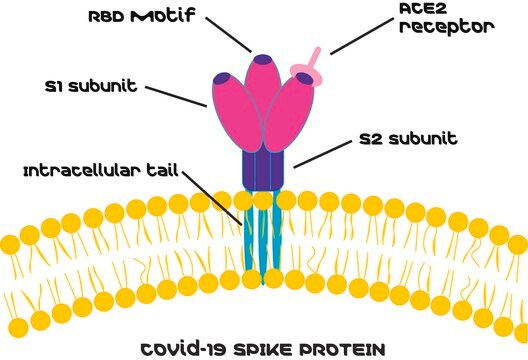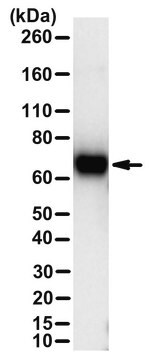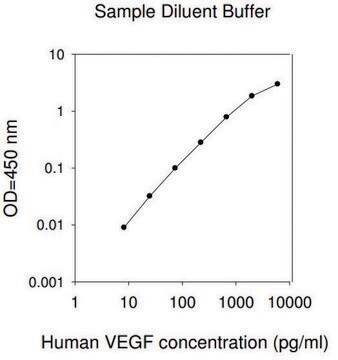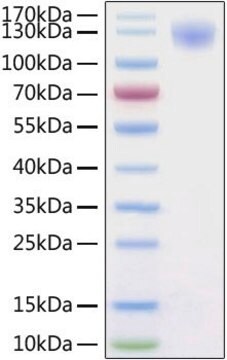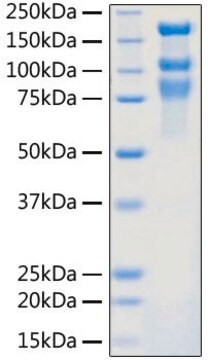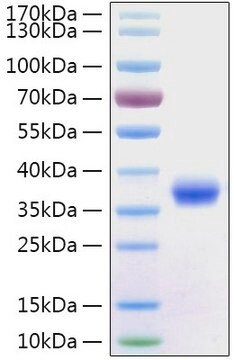추천 제품
Quality Level
형태
lyophilized powder
solid
종 반응성
viral
UniProt 수납 번호
저장 온도
−20°C
타겟 번역 후 변형
unmodified
유전자 정보
SARS coronavirus ... S(43740568)
일반 설명
Severe Acute Respiratory Syndrome Coronavirus 2 (SARS-CoV-2) or (2019-nCoV) is a novel coronavirus that emerged in December 2019 and since then has infected millions of people worldwide.1 The Spike protein (also known as S protein) is the most studied of the coronaviruses proteins, since it contains the Receptor-Binding-Domain (RBD) for the ligand on the host cell membrane (the ACE2 protein), and also has epitopes recognized by T and B cells
특이성
SARS-COV-2-Spike-RBD epitope (370-394) is a synthetic peptide corresponding to the amino acid sequence of Spike RBD region (GeneID: QHD43416.1) in positions 370-394.Peptides derived from the SARS-COV-2-Spike-RBD protein can be recognized by anti-SARS-CoV-2-Spike protein antibodies.
면역원
S370-394: nsasfstfkcygvsptklndlcftn
애플리케이션
The peptide may be used in various immunochemical techniques including Immunoblotting and Elisa.
생화학적/생리학적 작용
The Spike protein (also known as S protein) is a type I trimeric glycoprotein that is presented on the virion membrane, giving it the appearance of a crown. The protein has two subunits: S1, or bulb, that contains the RBD3-10; and S2, or stalk, responsible for the fusion of the virion with the host cell membrane. The main receptor for SARS-CoV and SARS-CoV-2 on the membrane of the target cells is the Angiotensin 2 Converting Enzyme (ACE2), a metallopeptidase present on the membrane of many cells, including type-I and -II pneumocytes, small intestine enterocytes, kidney proximal tubules cells, the endothelial cells of arteries and veins, and the arterial smooth muscle, among other tissues.15-18
물리적 형태
Supplied as a lyophilized powder.Purity: ≥95% (HPLC)
저장 및 안정성
Store the product at −20 °C. After initial thawing, it is recommended to store the peptide in working aliquots at −20°C. Recommended thawing solution: Water.
면책조항
Unless otherwise stated in our catalog or other company documentation accompanying the product(s), our products are intended for research use only and are not to be used for any other purpose, which includes but is not limited to, unauthorized commercial uses, in vitro diagnostic uses, ex vivo or in vivo therapeutic uses or any type of consumption or application to humans or animals.Data presented is the available current product information and provided as-is. This product has not been tested or verified in any additional applications, sample types, including any clinical use. Experimental conditions must be empirically derived by the user. Our Antibody Guarantee only covers tested applications stated herein and conditions presented in our product information and is not extended to publications.
Storage Class Code
13 - Non Combustible Solids
WGK
WGK 3
Flash Point (°F)
Not applicable
Flash Point (°C)
Not applicable
시험 성적서(COA)
제품의 로트/배치 번호를 입력하여 시험 성적서(COA)을 검색하십시오. 로트 및 배치 번호는 제품 라벨에 있는 ‘로트’ 또는 ‘배치’라는 용어 뒤에서 찾을 수 있습니다.
Daniel Wrapp et al.
Science (New York, N.Y.), 367(6483), 1260-1263 (2020-02-23)
The outbreak of a novel coronavirus (2019-nCoV) represents a pandemic threat that has been declared a public health emergency of international concern. The CoV spike (S) glycoprotein is a key target for vaccines, therapeutic antibodies, and diagnostics. To facilitate medical
Jian Shang et al.
PLoS pathogens, 16(3), e1008392-e1008392 (2020-03-10)
Coronaviruses recognize a variety of receptors using different domains of their envelope-anchored spike protein. How these diverse receptor recognition patterns affect viral entry is unknown. Mouse hepatitis coronavirus (MHV) is the only known coronavirus that uses the N-terminal domain (NTD)
To Sing Fung et al.
Annual review of microbiology, 73, 529-557 (2019-06-22)
Human coronavirus (HCoV) infection causes respiratory diseases with mild to severe outcomes. In the last 15 years, we have witnessed the emergence of two zoonotic, highly pathogenic HCoVs: severe acute respiratory syndrome coronavirus (SARS-CoV) and Middle East respiratory syndrome coronavirus
Jun Lan et al.
Nature, 581(7807), 215-220 (2020-04-01)
A new and highly pathogenic coronavirus (severe acute respiratory syndrome coronavirus-2, SARS-CoV-2) caused an outbreak in Wuhan city, Hubei province, China, starting from December 2019 that quickly spread nationwide and to other countries around the world1-3. Here, to better understand the
Zhixin Liu et al.
Journal of medical virology, 92(6), 595-601 (2020-02-27)
From the beginning of 2002 and 2012, severe respiratory syndrome coronavirus (SARS-CoV) and Middle East respiratory syndrome coronavirus (MERS-CoV) crossed the species barriers to infect humans, causing thousands of infections and hundreds of deaths, respectively. Currently, a novel coronavirus (SARS-CoV-2)
자사의 과학자팀은 생명 과학, 재료 과학, 화학 합성, 크로마토그래피, 분석 및 기타 많은 영역을 포함한 모든 과학 분야에 경험이 있습니다..
고객지원팀으로 연락바랍니다.